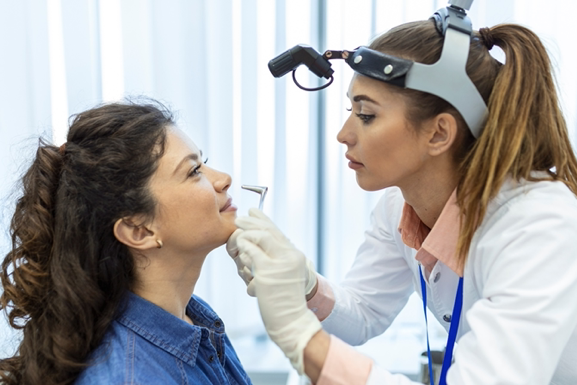Swelling in the tissue lining of the nose or sinuses often leads to sinus infections. The sinuses are hollow spaces located between your eyes, cheekbones, and in your forehead. They make mucus, a fluid-like substance inside the nose. Mucus helps to fight against dust, pollen, and allergens.

Source
Common Symptoms of Sinus Infections
- Sore throat
- Bad breath
- Headaches
- Sneezing
- Cough
- Loss of smell
- High fever
- Pain and fatigue
- Facial pain
- Runny nose
- Thick green or yellow sputum discharge
You risk getting a severe sinus infection if you continuously experience any of the preceding symptoms.
What Causes Sinus Infections?
Viruses, bacteria, and fungus can cause a sinus infection, or it may be pollens that can block your sinuses. A few specific causes that can lead to sinus infection are:
- A weak immune system is a significant factor that can cause a sinus infection. It can be from various medicines and illnesses in the past.
- A deviating septum can also cause sinus problems, as it is not straight and causes blockage on one side.
- Growths in the nose such as polyps.
- Seasonal allergies are also a major cause of sinus infections. It usually starts with sneezing.
- Common cold and cough, if severe, can lead to sinus infections.
- In infants, drinking bottles and feeders while laying down increases the chances of sinus infection.
- Smoking is a major cause of sinus problems in adults. It is not just harmful to regular smokers but can also harm the people around them.
Who Mostly Gets It?
It can happen to anyone in any condition. However, people with allergies, asthma, nasal problems, and abnormal anatomy of the nose are most likely to get a sinus infection. Smoking is also one of the most common reasons for sinus infection.
It is estimated that over 31 million people in the United States have sinus infections. These numbers are massive, and we can’t ignore the fact that this will increase in upcoming years.
How to Treat Sinusitis?
The treatment of Sinusitis depends on how severe the case is. A minor or early sinus infection can be treated with:
- Cold and allergic medications
- Taking fluids that relieve sore throat pain
- Decongestants

Source
If it doesn’t help even after 8 to 10 days, it means it gets severe, and there is a need for proper treatment. Your doctor may prescribe you:
- Painkillers: Ibuprofen is a drug that relieves pain and provides comfort to the affected individuals.
- Antibiotics: Your ENT specialist might prescribe you antibiotics if painkillers won’t help. It would be a complete course of antibiotics for 10 to 14 days.
- Nasal sprays: These are commonly in use by sinus patients as it gives comfort to them.
- Anti allergies: Sinus infections sometimes happen due to allergies. Anti-allergens like antihistamines are often used to overcome sinus infections due to allergies.
- Surgery: In severe cases, doctors may perform surgery to remove blockages if medications are not working.
Sinus Infections: Visit an ENT Specialist for Early Detection and Treatment
Consulting ENT specialists will get you on the right track if you are affected by a severe sinus infection. Reducing symptoms with various remedies at home will likely not be enough to beat the infection.
So, book your appointment now with Dr. Michael C. Burnett at Ear, Nose & Throat of New York and say goodbye to your sinus problems. Call us today at to discuss your options.
Dr. Michael C. Burnett
115 East 57th Street
Suite 600
New York, NY 10022
212-867-4813







